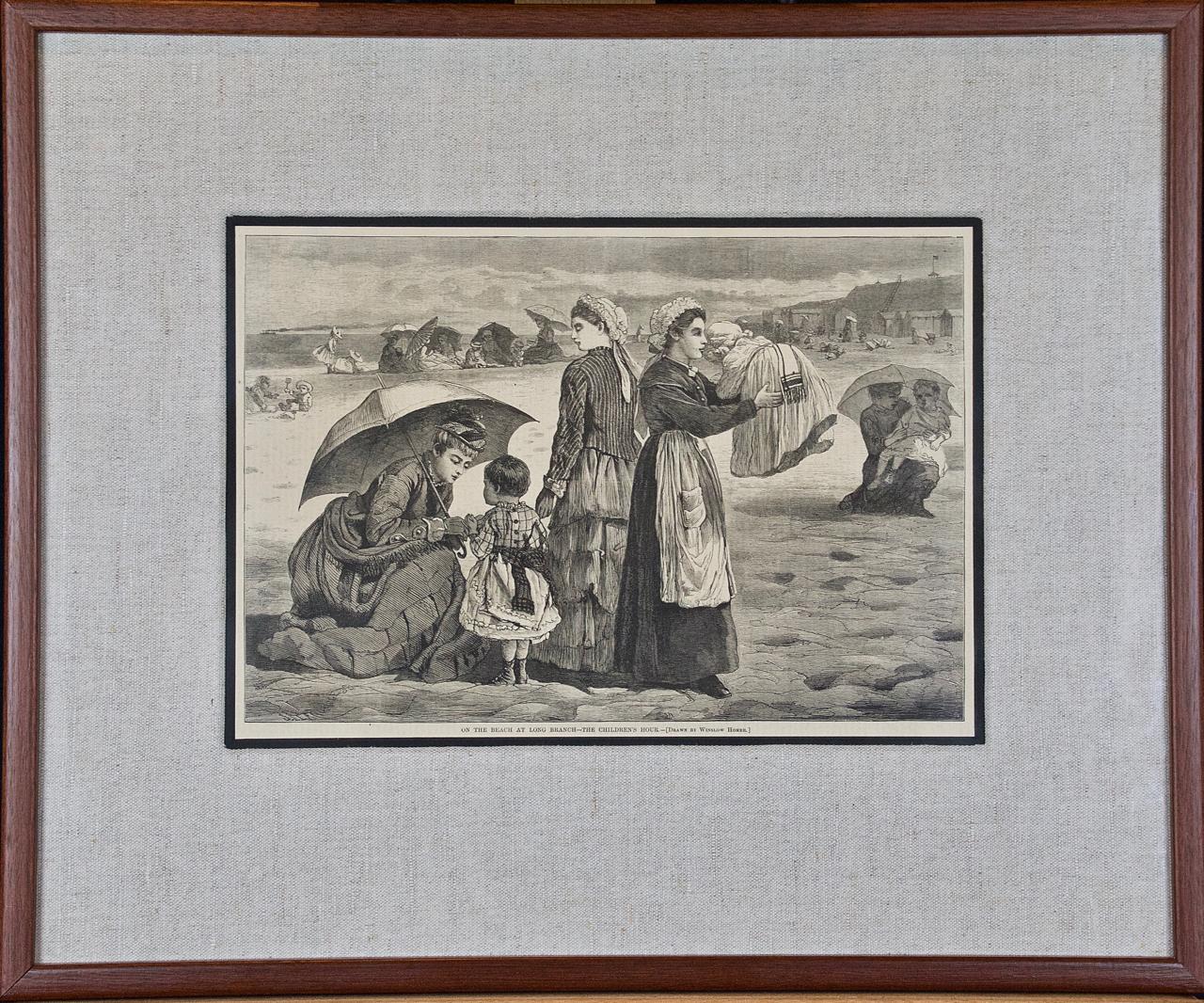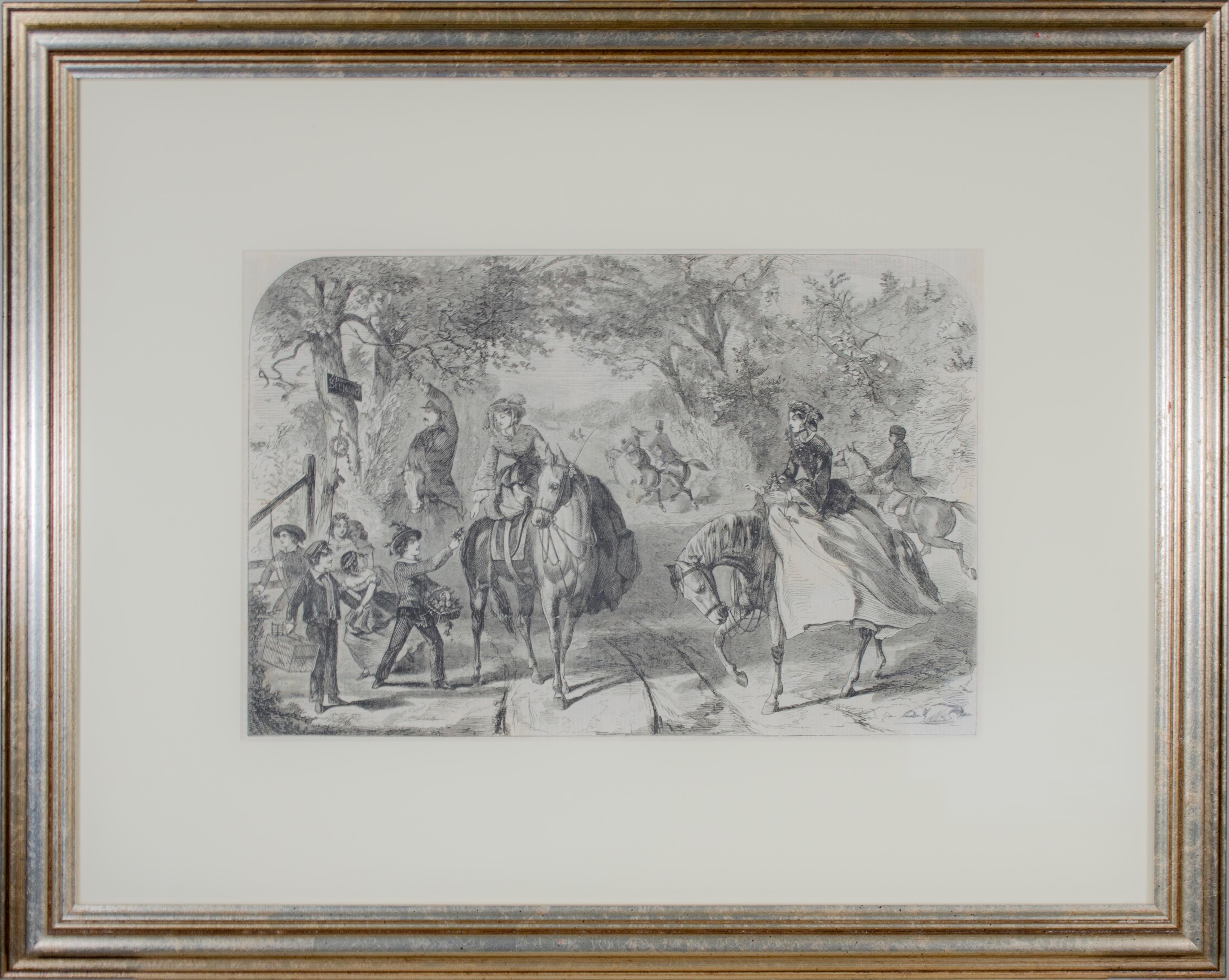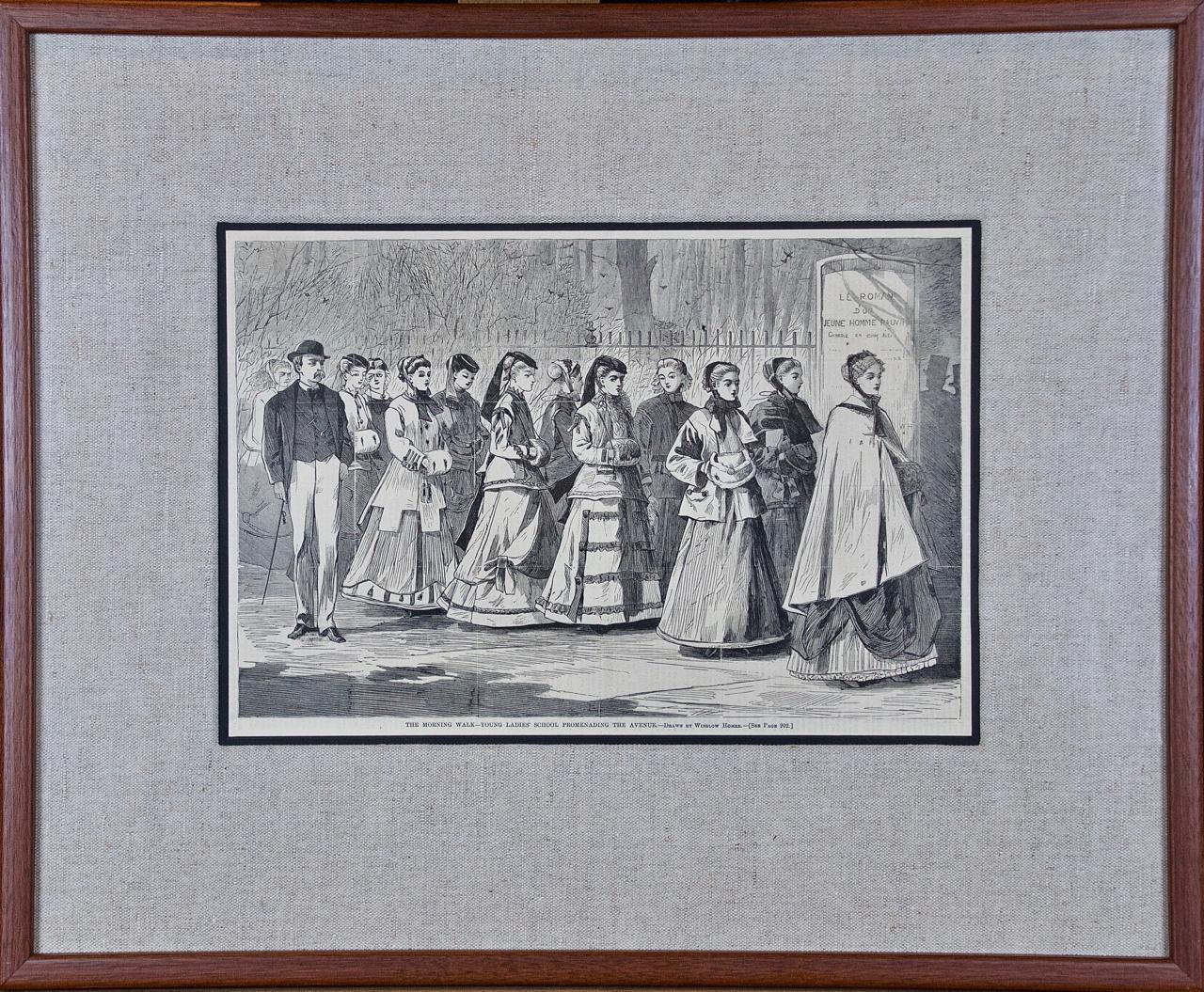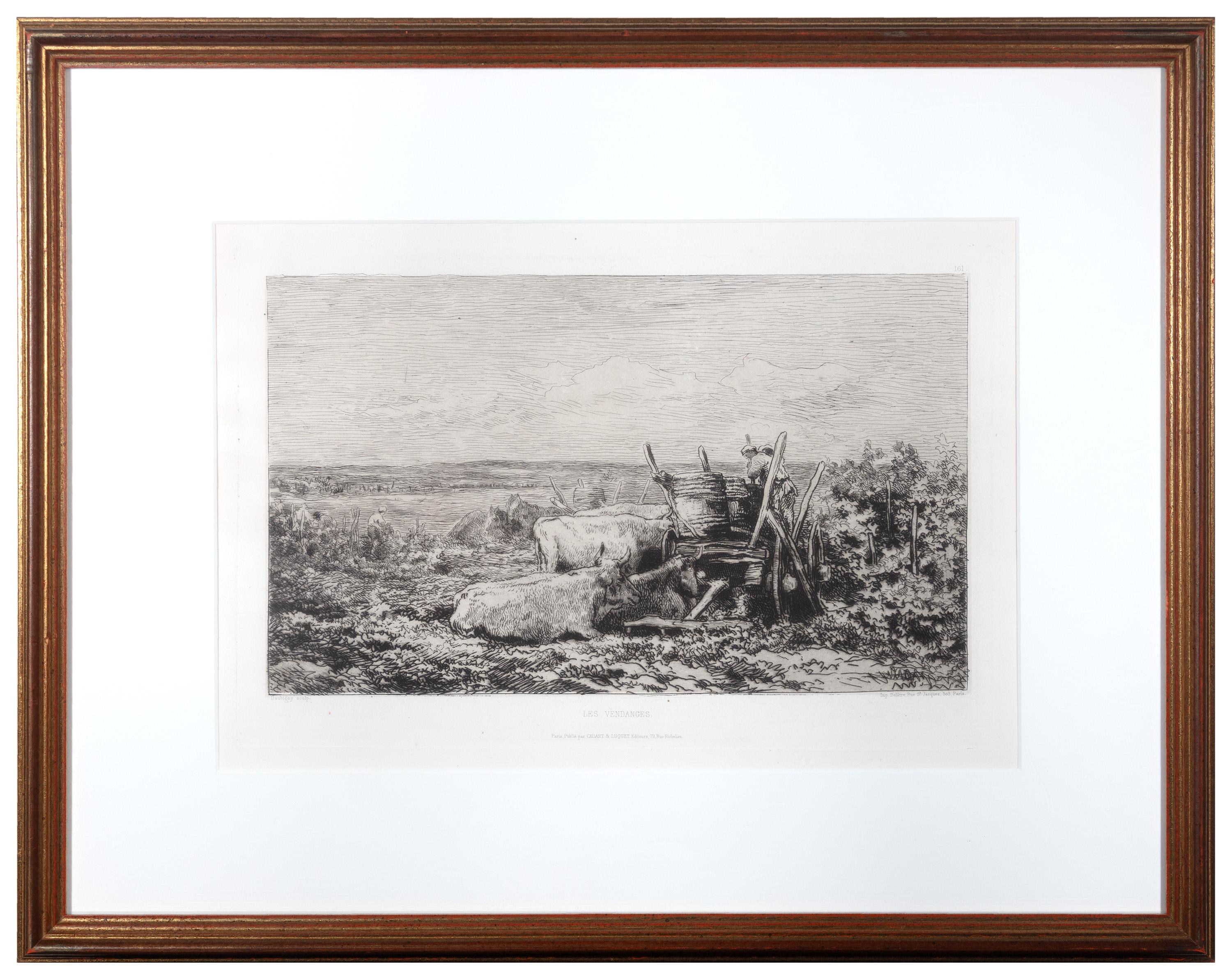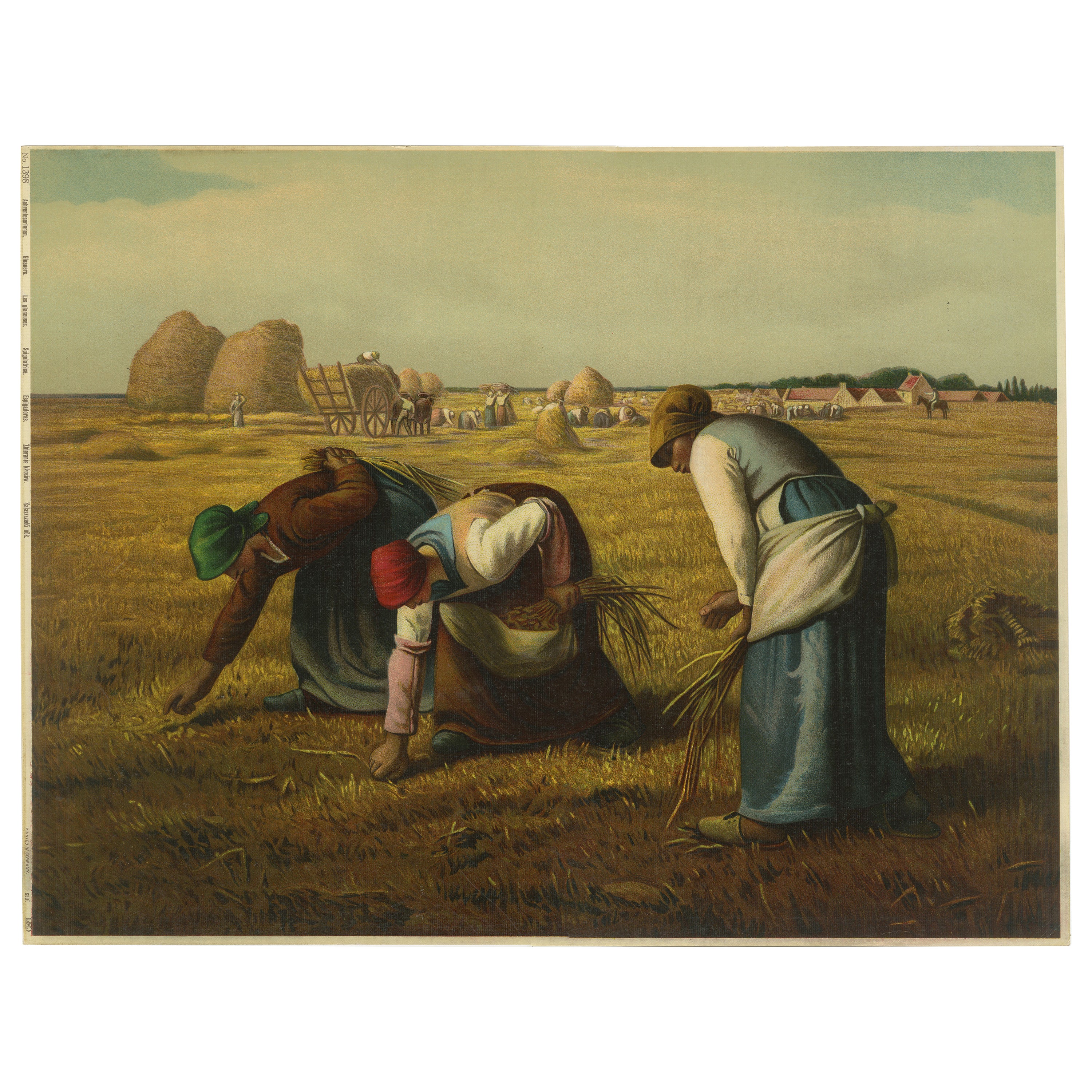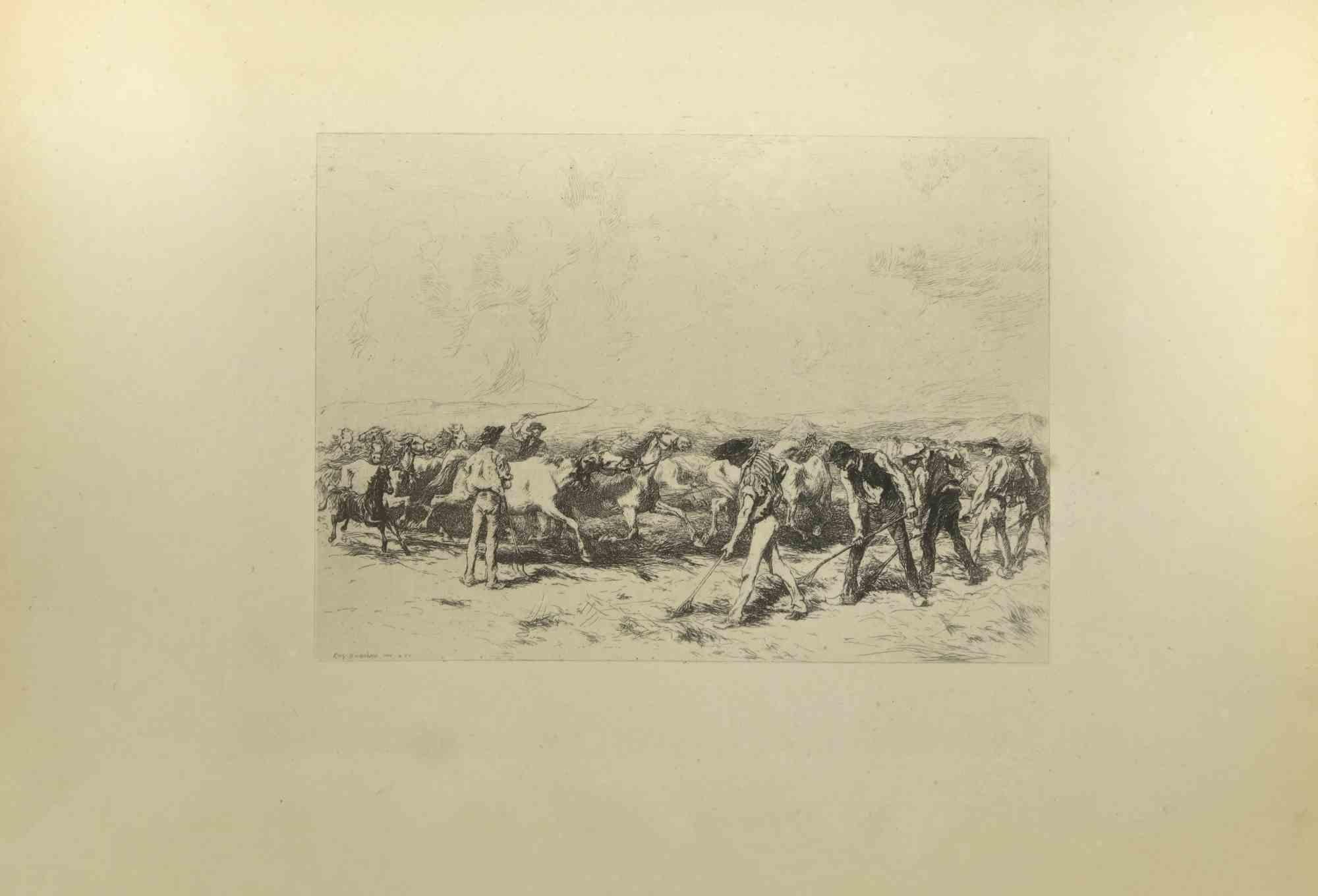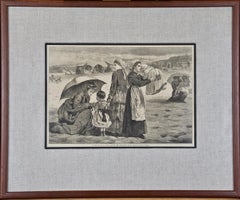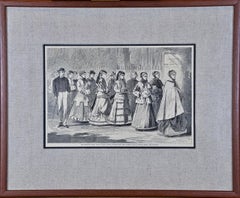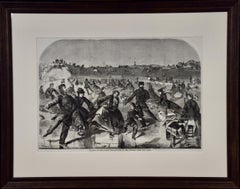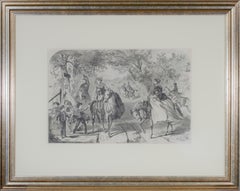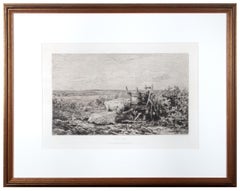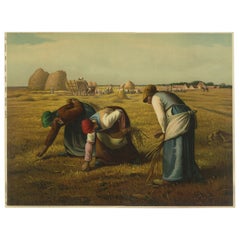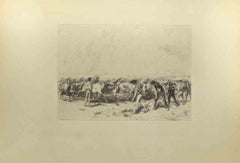Items Similar to Winslow Homer 19th Century Woodcut Engraving "Making Hay"
Want more images or videos?
Request additional images or videos from the seller
1 of 9
Winslow Homer 19th Century Woodcut Engraving "Making Hay"1872
1872
$875
£667.44
€760.42
CA$1,229.82
A$1,341.70
CHF 710.42
MX$16,077.41
NOK 9,047.63
SEK 8,273.39
DKK 5,677.91
About the Item
This Winslow Homer woodcut engraving entitled "Making Hay", was published in Harper's Weekly in the July 6, 1872 edition. It depicts a two men hand cutting high grass on a hill. The man in the foreground is looking at a young boy and a girl (presumably his children), who are sitting on the ground with a picnic basket.
This beautiful Homer woodcut engraving is presented in a brown wood frame and a light beige fabric mat with a black inner mat. The print is in excellent condition.
There are two other Homer woodcut engravings in identical frames and mats that are listed on 1stdibs. See LU117326148332 and LU117326148272. These would make a wonderful display grouping. A discount is available for the purchase of two or all three of these prints.
This Winslow Homer engraving is held by many museums, including: The Metropolitan Museum of Art, The Smithsonian Museum and The Chicago Art Institute.
Winslow Homer (1836-1910) was an American landscape painter, printmaker and publication illustrator. He is considered one of the most important American artists of the 19th-century. Largely self-taught Homer initially worked as an illustrator for various publications, including: Harper's Weekly, Frank Leslie's Illustrated Newspaper and Ballou's Pictorial Magazine. He worked for Harper's during the Civil War, producing woodcut engravings depicting the personal experiences of soldiers. He later became a master of oil and watercolor painting, often focussing on maritime themes.
Harper’s Weekly, published in New York, was an extremely popular publication in the nineteenth and early twentieth centuries. In weekly issues Harper’s reported the news, entertained with literature, poetry and art, as well as educating its readers about world affairs and new inventions. It's woodcut engraved illustrations and literature added to its popularity, employing major artists and authors of the time, including Winslow Homer, Charles Dickens, William Makepeace Thackeray and Thomas Nast.
- Creation Year:1872
- Dimensions:Height: 18.5 in (46.99 cm)Width: 22.32 in (56.7 cm)Depth: 1.57 in (3.99 cm)
- Medium:
- Movement & Style:
- After:Winslow Homer (1836 - 1910, American)
- Period:
- Condition:
- Gallery Location:Alamo, CA
- Reference Number:Seller: # 35981stDibs: LU117326148342
About the Seller
5.0
Platinum Seller
Premium sellers with a 4.7+ rating and 24-hour response times
Established in 2011
1stDibs seller since 2019
298 sales on 1stDibs
Typical response time: 1 hour
- ShippingRetrieving quote...Shipping from: Alamo, CA
- Return Policy
More From This Seller
View AllWinslow Homer Framed Original 19th Century Wood Engraving "On the Beach"
By Winslow Homer
Located in Alamo, CA
This Winslow Homer wood engraving entitled "On the Beach at Long Branch, The Children's Hour", was published in Harper's Weekly in the August 15, 1874 ed...
Category
1770s American Impressionist Landscape Prints
Materials
Engraving
Winslow Homer 19th Century Woodcut Engraving "The Morning Walk"
By Winslow Homer
Located in Alamo, CA
This Winslow Homer woodcut engraving entitled "The Morning Walk, Young Ladies' School Promenading the Avenue", was published in Harper's Weekly in the...
Category
1870s American Impressionist Landscape Prints
Materials
Engraving, Woodcut
"Skating on Ladies' Pond Central Park": Winslow Homer 19th C. Woodcut Engraving
By Winslow Homer
Located in Alamo, CA
This Winslow Homer woodcut engraving entitled "Skating on the Ladies' Skating-Pond in Central Park, New York", was published in Harper's Weekly in the January 28, 1860 edition. It depicts a large number of men, women and children skating on a recently opened pond in Central Park. At the time of publication of this engraving, Central Park was in the early stages of construction. This engraving documents the very early appearance of Frederick Law Olmstead and Calvert Vaux's masterpiece of landscape design. According to Olmsted, the park was "of great importance as the first real Park made in this century – a democratic development of the highest significance". The people of New York were very proud of the plans for their park. It was stated at the time: "Our Park, which is progressing very satisfactorily under the management of the Commissioners, will undoubtedly be, one of these days, one of the finest place of the kind in the world...Those who saw the Park before the engineers went to work on it are amazed at the beautiful sites which have been contrived with such unpromising materials; all fair persons believe that the enterprise is managed with honesty and good taste."
Skating was rapidly rising in national popularity in part due to the opening of Central Park’s lake to skaters on a Sunday in December 1858 with 300 participants. The following Sunday it attracted ten thousand skaters. By Christmas Day, a reported 50,000 people came to the park, most of them to skate. There were rules governing who could use the skating pond. “The Ladies’ Pond...
Category
1870s American Impressionist Landscape Prints
Materials
Engraving, Woodcut
$940 Sale Price
20% Off
A Signed Etching of a Pastoral Scene in Picardy, France by Paul Emile Lecomte
By Paul Emile Lecomte
Located in Alamo, CA
A beautiful aquatint etching of a serene pastoral scene in the Picardy region of northern France by Paul Emile Lecomte (1877-1950). A mother and child are seen walking down a path in...
Category
Early 20th Century Impressionist Landscape Prints
Materials
Aquatint
"A Game of Lacrosse": A Hand-colored 19th Century Woodcut Engraving by Hall
Located in Alamo, CA
A colorful and attractive hand-colored 19th century woodcut engraving entitled "A Game of Lacrosse" after a drawing by W. H. Hall. It was published in New York in Harper's Weekly on May 10, 1884. It depicts a scene from an intense lacrosse game.
This hand-colored woodcut engraving is presented in a red mat that measures 16" high x 20.63" wide. The sheet measures 10.63" high x 15.88" wide. There is a central fold, as issued. The print is in excellent condition.
Lacrosse is the oldest sport in North America, possibly originating as far back as the 1400's. The sport was first invented by Native Americans, who originally played it as a means to toughen braves for war or to settle tribal disputes. It was played by between 100 and 1,000 participants at a time. There were no strict boundaries and the game could cover miles and take days to complete. It was very violent with many injuries, which were sometimes fatal. The game was unknown to whites until the 17th century when a Jesuit priest observed Heron Indians playing it. He thought the stick and netting resembled the "crosier" carried by bishops during religious ceremonies, This led to the name "la crosse".
A Canadian dentist standardized the rules of the game in 1867 and the 1st college team was created at New York University in 1877. The game gained national attention and popularity in 1956 when the Hall-of-Fame football player Jim Brown...
Category
1880s Landscape Prints
Materials
Woodcut
"California Gold Diggers": A 19th C. Hand-colored Woodcut Gold Rush Scene
By John Andrew
Located in Alamo, CA
This is a framed hand-colored woodcut engraving entitled "California Gold Diggers - A Scene From Actual Life At The Mines" created by John Andrew and publi...
Category
Mid-19th Century Landscape Prints
Materials
Woodcut
You May Also Like
19th century woodcut engraving print figurative American forest trees scene
By Winslow Homer
Located in Milwaukee, WI
The present woodcut engraving is an original print designed by Winslow Homer, originally published in Harper's Weekly on April 30, 1859. It is an excellent example of the many prints Homer produced of fashionable people engaged in leisurely activities, in this case along a picturesque countryside lane. The sign reading 'Belmont' on the left indicates this is probably near his home in Belmont Massachusetts. The image presents multiple figures, both men and women, riding horseback: Some in the distance gallop away, toward a town marked by a church steeple beyond. Three others in the foreground, including two equestrian women, gather around a group of children who have been gathering flowers and trapping birds...
Category
1850s Victorian Figurative Prints
Materials
Engraving, Woodcut
19th century landscape etching farm field black and white figures pastoral scene
By Charles François Daubigny
Located in Milwaukee, WI
Charles Francois Daubigny's etching from around 1865 is an example of the Barbizon painters' preoccupations. Entitled "Les Vendages," the work depicts peasants bringing in the harves...
Category
Mid-19th Century Barbizon School Landscape Prints
Materials
Etching
Harvest Workers in the Field, After Millet, Antique Chromolithograph, ca.1900
Located in Langweer, NL
Harvest Workers in the Field, After Millet, Antique European Chromolithograph
This powerful late 19th-century European chromolithograph depicts a rural harvesting scene inspired by ...
Category
Antique Late 19th Century German Prints
Materials
Paper
The Framers - Etching by Eugène Burnand - Late 19th century
Located in Roma, IT
The Framers is an original etching realized by Eugène Burnand (1850-1921) in the Late 19th century.
Signed on the plate.
Good conditions with foxing.
The artwork is realized thro...
Category
Late 19th Century Modern Figurative Prints
Materials
Engraving, Etching
Pasture - Original Etching - 1868
Located in Roma, IT
Pasture is an original print realized in 1868.
Black and white etching. 2nd state (as reported on the lower right margin)
Signed (unreadible signature) and dated on the lower left ...
Category
Late 19th Century Modern Figurative Prints
Materials
Paper, Etching
Peasants - Woodcut Print by Augusto Monari - Early-20th Century
Located in Roma, IT
Peasants is a woodcut print realized by Augusto Monari in the Early-20th Century.
Good conditions.
The artwork is depicted through confident strokes in a well-balanced composition.
Category
Early 20th Century Modern Figurative Prints
Materials
Woodcut
More Ways To Browse
19th Century Engraving Framed
Picnic Basket
Used Picnic Baskets
Antique Picnic Basket
Antique Picnic Baskets
Robert Peel
Saxophone Art
Stratford Upon Avon
Van Gogh Drawings
Wpa Sign
Balloon Rabbit
Bearbrick 1000
Benson Signed
Bronze Abstract Horse
Burnt Wood Sculpture
Cat Pastel Paintings
Charles Culver
Checkered Floor
